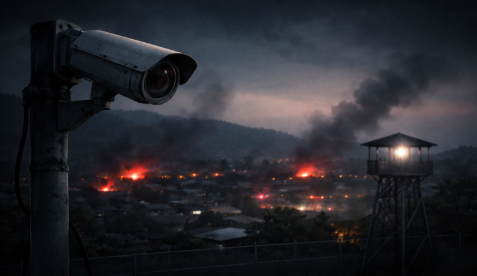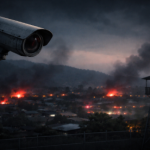Written By Idowu Ephraim Faleye – 08132100608
Yorubaland stands today at a dangerous crossroads. The creeping insecurity that once seemed distant has found a home among us. From the hinterlands of Ekiti to the forests of Oyo, from the villages of Osun to the borders of Ogun, reports of deadly raids, kidnappings, and brazen attacks on our people are no longer strange news. The bitter truth is that the survival of Yorubaland now depends not on empty prayers or hollow political promises, but on our ability to take our destiny into our own hands, rise as one people, and defend our land without allowing the poison of religion or politics to divide us.
In the past, Yorubaland was known for its organized communities, respect for order, and the fierce bravery of its warriors when called upon to protect the homeland. Our forefathers did not wait for foreign saviours. They established security systems and enforced justice within their territories. It was this spirit of self-reliance, unity, and boldness that allowed the Yoruba to flourish even amidst the turbulence of the colonial and post-colonial eras. Today, that same spirit must be urgently rekindled if we are to survive the threats that now loom over our towns and villages.
We cannot continue to ignore the alarming statistics. Between 2019 and 2024, Nigeria recorded over twelve thousand civilian deaths from violent attacks, with a growing number now happening in the southern parts, including areas traditionally considered safe like parts of Ondo, Oyo, and Ogun States. The wave of killings that once seemed confined to the North has broken through into the heart of Yorubaland. Farmlands are being abandoned out of fear, rural communities are emptying, and our food security is increasingly at risk. The banditry, kidnappings, and invasions we read about yesterday are now knocking on our doors.
Yet, even in the face of such existential threats, some of us are still clinging to political divisions and religious sentiments, forgetting that bullets do not ask whether you are Christian, Muslim, APC, PDP, or Yoruba of one town or another. An enemy that targets your life does not care about the party you vote for or the church you attend. What matters now is our shared identity as Yoruba people and the urgent need to defend our collective existence.
In many parts of Yorubaland today, community-driven security efforts have sprung up as a response to the failure of centralized policing. Groups like the Amotekun Corps, initiated by the Southwest governors, are a step in the right direction, but Amotekun alone cannot save us if the people themselves remain divided and inactive. Community vigilance, local defence initiatives, early-warning systems, and self-organization at the town and village levels are no longer optional—they are matters of survival.
Read Also: A Hard Look at Our Last Economic Chance: If Tinubu Cannot, Then Who Possibly Can?
The Constitution of Nigeria recognizes the right to self-defence. Within this legal framework, it is both a right and a duty for communities to organize to defend themselves when faced with life-threatening situations. We must embrace this reality with wisdom and strategy, not with lawlessness. Defence must be structured, disciplined, and rooted in a deep sense of responsibility to protect lives, not escalate violence unnecessarily.
Historical memory should guide us. The Ekiti Parapo alliance of the 19th century, which saw different Yoruba kingdoms putting aside their rivalries to resist external domination, remains one of the most powerful examples of what we can achieve when we stand united. Today, our enemy may not wear the uniform of a colonial invader, but the threat they pose to our land and our future is no less grave. It is no longer about town versus town, Christian versus Muslim, or political party versus political party. It is about ensuring that our children will still have villages to call home, farms to cultivate, markets to trade, and a culture to pass down.
The infiltration of forests across Oyo, Ogun, Ondo, and Ekiti by unknown armed groups should alarm every conscious Yoruba son and daughter. When criminals establish hideouts in our forests, it is only a matter of time before they begin to launch attacks on nearby communities. If we continue to fold our arms and depend solely on distant authorities to come to our rescue, we will be gambling with the very existence of our homeland.
The task ahead is not easy, but it is necessary. Every town and village must set up effective local security committees composed of trustworthy individuals. These committees must work closely with traditional rulers, local hunters, and security agencies to monitor suspicious activities, enforce community vigilance, and share intelligence swiftly. Surveillance of our forests must be intensified, with traditional hunters leading the way because of their superior knowledge of the terrain. No group should be allowed to camp in our forests without accountability.
Moreover, the youth of Yorubaland must rise. This is not the time for aimless arguments on social media or waiting endlessly for government jobs that may never come. Our youth must organize themselves into disciplined, community-focused volunteer groups trained in basic security techniques. They must protect their communities, support local agriculture, revive rural economies, and resist all efforts to divide them along partisan or religious lines. The future belongs to the brave, not to the passive.
Traditional rulers must also understand that their thrones and titles mean nothing if their lands are overrun and their people scattered. They must work together across boundaries, not allowing petty rivalries to stand in the way of collective action. Town unions, diaspora associations, and Yoruba socio-cultural organizations must prioritize security funding, training, and community mobilization over endless talk shops and ceremonies.
Religious leaders have a role too. In every mosque, church, and shrine, the message must be clear: we have a duty to protect our people and land. Faith without action is empty. It is not unholy to defend oneself against murderers and invaders; it is, in fact, a sacred duty. Let the pulpits and prayer grounds become platforms for enlightenment, not division.
Critically, politicians must be reminded that their first obligation is to the safety and survival of the people, not to their re-election plans. Security must not be politicized. Whether one supports the governor, the senator, or the local councillor, it should make no difference when the security of the community is at stake. We must be bold to call out political leaders who fail to prioritize security. They must not be shielded by partisan loyalty when they are negligent with the lives of the citizens.
The Yoruba spirit has always been a resilient one. History records our civilization as sophisticated, brave, organized, and proud. We must not allow this legacy to be buried under the weight of complacency, cowardice, or misplaced loyalty. If our ancestors could build kingdoms without external aid, if they could withstand invasions and carve out a place of pride in African history, then we too, their descendants, must not be found wanting at this critical hour.
Read Also: There’s Silent War in the Forests of Yorubaland: Rise Before Our Land Falls
We must teach our children to love and defend their heritage. We must invest in community self-help projects that strengthen local economies and reduce vulnerability to external exploitation. We must organize community education programs to teach basic security awareness and disaster response. We must create a culture of unity and swift collective action whenever threats arise.
The Yoruba proverb says, “Ti a ba fi oju meji wo’gi, igi a wo.” — If we look at a tree with two minds, it will fall. We cannot afford a divided mind about the need to protect Yorubaland. We must be united, focused, and determined. Time is not on our side.
Let it be said of our generation that when danger knocked, we did not bicker over religion or politics; we rose as one to defend our land, our people, and our future. Let it be said that the spirit of Oduduwa did not die in us. Let it be remembered that we took our destiny into our own hands and secured it with courage, wisdom, and unity.
The future of Yorubaland depends on the actions we take today. We must rise, and we must rise together.
Idowu Faleye is the founder and publisher of EphraimHill DataBlog, a platform committed to Data Journalism and Policy Analysis. With Public Administration and Data Analytics background, his articles offer research-driven insights on Politics, governance and Public Service delivery











































![The Trend of Insecurity in Nigeria. [Part 2]](https://ephraimhilldc.com/wp-content/uploads/2024/09/Computer-Monitoring-of-Remote-areas.png)




































